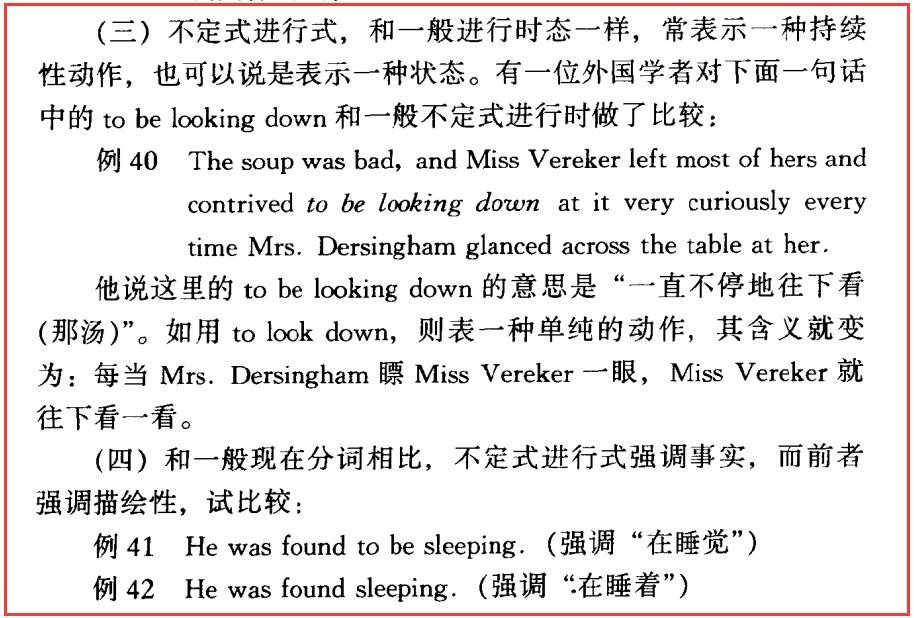5 形容词后接不定式进行式的用法(to be doing)
在看前面一个网友的提问题(https://www.cpsenglish.com/question/51298)时,无意中看到2021年高考英语浙江卷的阅读理解A中的一个句子:
He was thrilled to be doing the comedy that he always felt he should do.
该句的前后文语境如下:
Did Nielsen then feel content in his career? Yes and no. He was thrilled to be doing the comedy that he always felt he should do, but even during his last few years, he always had a sense of curiosity, wondering what new role or challenge might be just around the corner. He never stopped working, never retired.
我的疑问是:这里为什么用不定式的进行式 to be doing,而不是用一般式 to do 呢?用不定式的进行式与一般式有什么区别吗?
最佳答案 2021-06-29 16:14
不定式进行式的一个用法是表示持续性的动作:
He was thrilled to be doing the comedy that he always felt he should do. 他很高兴他一直在出演他一直觉得自己应该演的喜剧。(即一直在做自己一直喜欢的事)
但不同的语境中,不定式的进行式会有不同的用法,比如下面一句,不定式的进行式表示将来(正如进行时态有时也表示将来一样):
She was thrilled to be interviewing her childhood heroine. 能够采访她孩提时的女偶像,她简直欣喜若狂。(指即将会采访)
下面是薄冰老师在一本书中对不定式进行式用法的解释,可以参考:


其它 1 个回答
不定式进行式to be doing表达的是谓语动词发生的时候,不定式的动作正在进行.表达的意思是:在他be doing the comedy的时候,他是be thrilled的.如果仅仅是to do形式,表达的概念一般是还没做或者与谓语动词差不多同时发生,不能表达这种进行的概念,一般形式表达可以理解为他因为要做某事而thrilled.
其它例句是:
He pretended to be listening to his teacher;---They are said to be discussing in the meeting room.
而一般式to do主要表达后于谓语时间的动作或与谓语动词几乎同时发生。
- 3 关注
- 2 收藏,3844 浏览
- 优优 提出于 2021-06-23 10:39
相似问题
- to be doing 能做宾补吗 1 回答
-
 《高考英语备考1号·速效编》
《高考英语备考1号·速效编》
-
 《高考英语备考1号·写作编》
《高考英语备考1号·写作编》
-
 《高中英语晨读晚记》
《高中英语晨读晚记》
-
 《高中英语错题笔记》
《高中英语错题笔记》
-
 《零起点考大学英语》
《零起点考大学英语》
-
